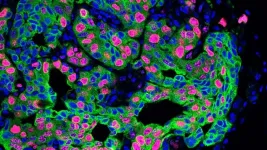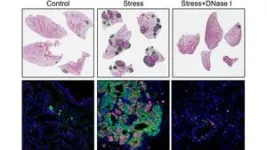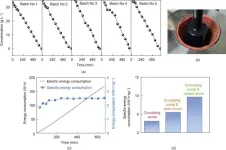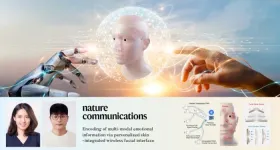(Press-News.org) Stress is inevitable. But too much of it can be terrible for our health. Chronic stress can increase our risk for heart disease and strokes. It may also help cancer spread. How this works has remained a mystery—a challenge for cancer care.
Xue-Yan He, a former postdoc in Cold Spring Harbor Laboratory (CSHL) Adjunct Professor Mikala Egeblad’s lab, says, “Stress is something we cannot really avoid in cancer patients. You can imagine if you are diagnosed, you cannot stop thinking about the disease or insurance or family. So it is very important to understand how stress works on us.”
Now, He and Egeblad may have reached a breakthrough in understanding exactly that. Working with CSHL Professor Linda Van Aelst, they discovered that stress causes certain white blood cells called neutrophils to form sticky web-like structures that make body tissues more susceptible to metastasis. The finding could point to new treatment strategies that stop cancer’s spread before it starts.
The team arrived at their discovery by mimicking chronic stress in mice with cancer. They first removed tumors that had been growing in mice’s breasts and spreading cancer cells to their lungs. Next, they exposed the mice to stress. What He observed was shocking.
“She saw this scary increase in metastatic lesions in these animals. It was up to a fourfold increase in metastasis," Egeblad recalls.
The team found that stress hormones called glucocorticoids acted on the neutrophils. These “stressed” neutrophils formed spider-web-like structures called NETs (neutrophil extracellular traps). NETs form when neutrophils expel DNA. Normally, they can defend us against invading microorganisms. However, in cancer, NETs create a metastasis-friendly environment.
To confirm that stress triggers NET formation, leading to increased metastasis, He performed three tests. First, she removed neutrophils from the mice using antibodies. Next, she injected a NET-destroying drug into the animals. Lastly, she used mice whose neutrophils couldn’t respond to glucocorticoids. Each test achieved similar results. “The stressed mice no longer developed more metastasis,” He says.
Notably, the team found that chronic stress caused NET formation to modify lung tissue even in mice without cancer. “It’s almost preparing your tissue for getting cancer,” Egeblad explains.
To Van Aelst, the implication, though startling, is clear. “Reducing stress should be a component of cancer treatment and prevention,” she says.
The team also speculates that future drugs preventing NET formation could benefit patients whose cancer hasn’t yet metastasized. Such new treatments could slow or stop cancer’s spread, offering much-needed relief.
END
Chronic stress spreads cancer … here’s how
2024-02-22
ELSE PRESS RELEASES FROM THIS DATE:
Markey study reveals extent of undiagnosed cancer cases due to COVID-19 pandemic
2024-02-22
Over 134,000 cancer cases went undiagnosed in the U.S. during the first 10 months of the COVID-19 pandemic, according to a new University of Kentucky Markey Cancer Center study.
The report published in JAMA Oncology Feb. 22 provides the first estimates of missed cancer diagnoses in 2020 using nationwide surveillance data.
Researchers have expected impacts to cancer detection as a result of delayed screenings and missed health care appointments due to the COVID-19 pandemic, but the extent of this impact had not been quantified until ...
NextGen Precision Health researchers uncover potential treatment for cardiovascular complications from type 2 diabetes
2024-02-22
New research at the Roy Blunt NextGen Precision Health building has discovered a potential treatment for an underlying cause of cardiovascular disease in people with Type 2 diabetes.
More than 30 million Americans live with Type 2 diabetes. One common feature of diabetes is the hardening and inflexibility of blood vessels caused by damage to the endothelial cells in the vascular system. Over time, this can lead to the development and progression of cardiovascular disease, which is the number one cause of death in diabetics. Because endothelial dysfunction is causally linked to cardiovascular disease, there is a considerable ...
Immune cell receptor provides promising immunotherapy target
2024-02-22
FOR IMMEDIATE RELEASE
Drugs that target a receptor on immune cells called activin receptor 1C may combat tumor-induced immune suppression and help patients’ immune systems fight back against cancer, according to a study by investigators at the Johns Hopkins Kimmel Cancer Center and its Bloomberg~Kimmel Institute for Cancer Immunotherapy.
The study, published online Jan. 8 in Oncoimmunology, identifies a new strategy cancer cells use to protect themselves from immune system attack, and suggests treatments that could counteract it. It shows that tumor cells and some immune cells produce proteins called activins that ...
Silicon microresonators for artificial neural networks
2024-02-22
Researchers have made significant progress in the development of artificial neural networks using tiny silicon devices called microresonators, paving the way for faster and more energy-efficient artificial intelligence systems. These networks mimic the computing capabilities of the human brain, breaking away from traditional digital computer architectures and leveraging the speed, low power dissipation and multi-wavelength capabilities of photonics.
A review article describing the implementations of neural networks using silicon microresonators was published Jan. 16 in Intelligent Computing, a Science Partner Journal.
Silicon microresonators ...
Scientists develop a simple blood test to quickly diagnose sarcoidosis
2024-02-22
Scientists develop a simple blood test to quickly diagnose sarcoidosis
NIH-funded tool can accurately identify the potentially life-threatening inflammatory disease
A research project supported by the National Institutes of Health has developed a tool to rapidly and inexpensively diagnose sarcoidosis, a chronic inflammatory disease marked by the growth of tiny lumps called granulomas in the lungs and other organs in the body. The tool, which uses a simple blood test, could allow for selective use of more invasive diagnostic tests often used to identify the ...
New electrochemical system enables efficient metal recovery from industrial wastewater
2024-02-22
A research team at Tsinghua University led by Professor Huijuan Liu has developed a new electrochemical system that promises to revolutionize metal recovery from industrial wastewater. The research was published in Engineering.
Industrial wastewater poses significant environmental hazards due to heavy metal pollution. Current methods for metal recovery, such as electrodeposition, suffer from interfacial ion transport limitations, resulting in slow and low-quality recovery. In their study, the team proposed a novel approach that integrates a transient electric field (TE) and swirling flow (SF) to improve mass transfer and promote interfacial ...
Non-solvating electrolytes enhance performance of organic electrode-based batteries
2024-02-22
In a groundbreaking study, Professor Won-Jin Kwak in the School of Energy and Chemical Engineering at UNIST, in collaboration with researchers from Hanyang University, have pioneered a method to significantly enhance the performance and lifespan of organic electrode-based batteries. The findings promise to accelerate the commercialization of eco-friendly batteries and pave the way for further advancements in the field.
Organic electrodes have long been recognized for their cost-effectiveness and natural abundance, making them a promising alternative to traditional lithium-ion battery ...
NIFTY® DNBSEQ-G99 platform receives CE-IVDD certification and advances prenatal care standards
2024-02-22
BGI Europe A/S, a wholly owned subsidiary of BGI Genomics, announced its NIFTY® non-invasive prenatal testing kit and software (CE-IVDD List B) were granted an extension under its existing CE-IVDD certification to include the DNBSEQ-G99 model to meet the European Union regulations for medical devices.
In January 2024, BGI Genomics unveiled the NIFTY® ultra-fast non-invasive prenatal genetic testing product, utilizing the innovative DNBSEQ-G99 platform. Designed for both small and medium throughput, this platform ensures top-notch testing ...
Living in violent neighborhoods affects children's brain development
2024-02-22
Living in neighborhoods with high levels of violence can affect children’s development by changing the way that a part of the brain detects and responds to potential threats, potentially leading to poorer mental health and other negative outcomes, according to research published by the American Psychological Association.
However, nurturing parents can help protect kids against these detrimental effects, according to the study, published in the journal Developmental Psychology.
“Decades of research ...
World’s first real-time wearable human emotion recognition technology developed!
2024-02-22
A groundbreaking technology that can recognize human emotions in real time has been developed by Professor Jiyun Kim and his research team in the Department of Material Science and Engineering at UNIST. This innovative technology is poised to revolutionize various industries, including next-generation wearable systems that provide services based on emotions.
Understanding and accurately extracting emotional information has long been a challenge due to the abstract and ambiguous nature of human affects such as emotions, ...





